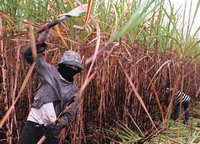Amazon rainforest may be used to grow sugarcane for ethanol
Brazilian agricultural officials and biofuel industry representatives stand for using devastated parts of the Amazon rainforest to grow sugarcane for ethanol.

Brazil's extensive use of ethanol and other biofuels has put it at the forefront of global efforts to fight climate change. But the country is also home to most of the Amazon rainforest, which scientists say plays an important role in cooling the Earth.
Former Agriculture Minister Odacir Klein, who now heads an association of biofuel producers, said a government plan to plant already-cleared areas of rainforest with sugarcane balances the need for biofuel with the need to protect the region, and is "very responsible."
"The government will not allow (Amazon sugarcane) plantations to damage the environment," Klein said at the Second International Conference on Agroenergy, which opened here Tuesday.
In August, President Luiz Inacio Lula da Silva proposed that parts of the Amazon be used to grow sugarcane, encouraging farmers to cultivate already-destroyed areas rather than clear more land.
Brazil's share of the Amazon, the world's largest rainforest, covers an area of about 4.1 million square kilometers (1.6 million square miles); 20 percent of that land has been razed.
"Environmentally protected areas must be protected, but there are natural niches and others that man has already exploited that can be used to grow sugarcane," said Frederico Duraes, head of agroenegy at the government's agriculture research institute.
Environmentalists say that runoff from sugar mills will pollute the region regardless. And, because it's cheaper to raze virgin forest than recover already-devastated lands, they warn illegal deforestation will be hard to control once Amazon sugar farming wins broad support.
Subscribe to Pravda.Ru Telegram channel, Facebook, RSS!




